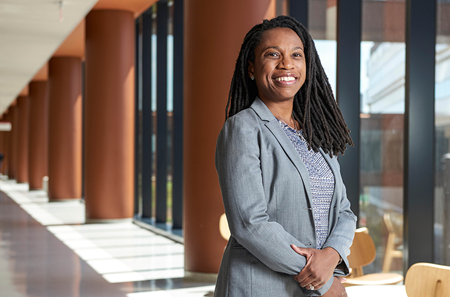Penn’s new Chief of Breast Surgery Lola Fayanju uses the storytelling power of data to tackle health disparities.
By Tonya Russell
 Oluwadamilola “Lola” Fayanju, MD, MA, MPHS, FACS, knows how to read – deeply, discovering nuances, understanding cultures and unwritten rules. Prior to earning her medical degree at Washington University and training in breast surgery at MD Anderson Cancer Center, she received her master’s degree in comparative literature from Harvard. It’s an unconventional stepping stone on the path to medicine, to be sure, but the skills she honed studying literature – analyzing, synthesizing, empathizing – are part of what make her an excellent doctor. More than that, these add to the clinical and research skills she’s using to create a more equitable future for all patients, specifically women of color.
Oluwadamilola “Lola” Fayanju, MD, MA, MPHS, FACS, knows how to read – deeply, discovering nuances, understanding cultures and unwritten rules. Prior to earning her medical degree at Washington University and training in breast surgery at MD Anderson Cancer Center, she received her master’s degree in comparative literature from Harvard. It’s an unconventional stepping stone on the path to medicine, to be sure, but the skills she honed studying literature – analyzing, synthesizing, empathizing – are part of what make her an excellent doctor. More than that, these add to the clinical and research skills she’s using to create a more equitable future for all patients, specifically women of color.
Fayanju joined Penn from Duke University in 2021. She is the chief of breast surgery for Penn Medicine, surgical director of the Rena Rowan Breast Center in the Abramson Cancer Center, and the Helen O. Dickens Presidential Associate Professor in the Perelman School of Medicine.
As a practicing breast surgeon, she relishes her ability to help each patient individually. But it’s research that appeals to her narrative instincts to describe a bigger picture: “It’s an opportunity to tell a story with data and to convince an audience that what you've learned is something worth listening to and ideally worth acting upon.”
One venue where she has advanced such an argument is a Journal of the American Medical Association essay, “Hiding in Plain Sight.” In it she notes that the unequal breast cancer death rates for women of different races – a widening gap that is now 41 percent higher in Black women – can’t be simply explained by an aggressive form of breast cancer that is more prevalent in Black women. The disparity stems from the more common type of breast cancer which occurs in women of all races.
Such points have become a hallmark of her work: challenging other physicians to not rely on biology to explain away social determinants that can lead to adverse outcomes. “That’s been the biggest surprise of my career,” she says, “learning just how much disparity is not rooted in biology, that it really is rooted often in things that we can do something about.”
Fayanju’s research, which is NIH-funded, focuses on finding those things that can be changed. She notes in the JAMA essay that these can include patient factors, such as the lack of a primary care physician or other limitations on access to care; clinician factors, such as implicit bias that alters their choices; and system factors, such as a state’s decision not to expand access to Medicaid.
Currently, she is expanding upon her exploration of barriers that prevent timely care by working to determine how COVID-19 has affected access to imaging, in collaboration with Penn radiologists Christine Edmonds, MD, and Emily Conant, MD. But this work doesn’t end with a cancer screening. “We are working on a project to facilitate delivery of care in a way that should hopefully reduce disparities and accessing diagnostic workup after a mammogram,” Fayanju says. When it comes to accessing surgery for those in need, Fayanju has welcomed the chance to partner with the Center for Surgical Health, a Penn medical student- and resident-led program launched last year that aids un- and underinsured patients who need surgery with care navigation, financial assistance, health literacy, and more.
After transitioning to her new academic home in the middle of a pandemic, Fayanju is still learning Penn’s culture and flow, which she describes as “vibrant and smart.” These choice words can also describe the new story of a more equitable world Fayanju is writing into existence.